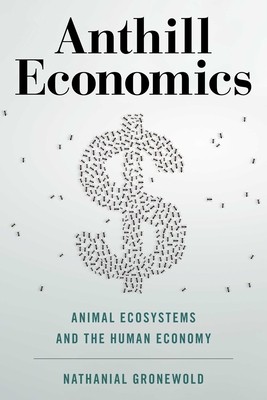
- We will send in 10–14 business days.
- Author: Nathanial Gronewold
- Publisher: Prometheus Books
- ISBN-10: 1633886522
- ISBN-13: 9781633886520
- Format: 15.8 x 23.1 x 2.8 cm, kieti viršeliai
- Language: English
- SAVE -10% with code: EXTRA
Reviews
Description
Does modern economic theory violate the basic laws of nature and physics? That is the question that award-winning environmental and energy writer Nathanial Gronewold sets out to answer in Anthill Economics. Drawing from the nascent field of biophysical economics, Anthill Economics puts forth a radical new way of thinking: as 21st-century citizens, the global economy truly is our human ecosystem. It is where raw materials are sourced, goods are supplied, energy is converted, and capital is exchanged. Shouldn't it stand to reason that the same principles that affect animal ecosystems (like population density, habitation patterns, and energy return on investment) similarly apply to our -albeit more complex -human ecosystem, too? With an innovative and cross-disciplinary approach, Gronewold draws comparisons from both the animal kingdom and the atomic world. The rollercoaster-like rise and fall of the caribou population on a remote island can teach us about resource allocation. The behavior of squirrels gathering nuts is a lesson in energy return on investment. Could the high unemployment rates of anthill colonies shed light on problems with the human job market? And, will global warming change these patterns for humans and insects alike? Furthermore, if certain laws of physics can be used to explain the distribution of energy in a complex physical system, could these same laws also explain the distribution of money in a complex economic system as well? This clearly written book full of illuminating ecological analogies provides a more complete understanding of human commerce shaped by the rules of nature and laws of physics.
EXTRA 10 % discount with code: EXTRA
The promotion ends in 23d.01:31:19
The discount code is valid when purchasing from 10 €. Discounts do not stack.
- Author: Nathanial Gronewold
- Publisher: Prometheus Books
- ISBN-10: 1633886522
- ISBN-13: 9781633886520
- Format: 15.8 x 23.1 x 2.8 cm, kieti viršeliai
- Language: English English
Does modern economic theory violate the basic laws of nature and physics? That is the question that award-winning environmental and energy writer Nathanial Gronewold sets out to answer in Anthill Economics. Drawing from the nascent field of biophysical economics, Anthill Economics puts forth a radical new way of thinking: as 21st-century citizens, the global economy truly is our human ecosystem. It is where raw materials are sourced, goods are supplied, energy is converted, and capital is exchanged. Shouldn't it stand to reason that the same principles that affect animal ecosystems (like population density, habitation patterns, and energy return on investment) similarly apply to our -albeit more complex -human ecosystem, too? With an innovative and cross-disciplinary approach, Gronewold draws comparisons from both the animal kingdom and the atomic world. The rollercoaster-like rise and fall of the caribou population on a remote island can teach us about resource allocation. The behavior of squirrels gathering nuts is a lesson in energy return on investment. Could the high unemployment rates of anthill colonies shed light on problems with the human job market? And, will global warming change these patterns for humans and insects alike? Furthermore, if certain laws of physics can be used to explain the distribution of energy in a complex physical system, could these same laws also explain the distribution of money in a complex economic system as well? This clearly written book full of illuminating ecological analogies provides a more complete understanding of human commerce shaped by the rules of nature and laws of physics.


Reviews